#yevgeni onegin
Quote
gölgede uyuyan sensin ey kutsal anı!
samuel beckett - proust
#Samuel Beckett#proust#Marcel Proust#alain de botton#kayıp zamanın izinde#albertin kayıp#yakalanan zaman#kötülük çiçekleri#charles baudelaire#paris sıkıntısı#arthur rimbaud#cehennemde bir mevsim#aleksandr puşkin#yevgeni onegin#anna karenina#nilgün marmara#beyaz geceler#dostoyevski#andrei tarkovsky#solaris#ingmar bergman#şiir#şiir blog#kitap#kitap kurdu#Federico García Lorca#Jorge Luis Borges#ahmet hamdi tanpınar#oyunlarda yaşayanlar#T.S.Eliot
23 notes
·
View notes
Text
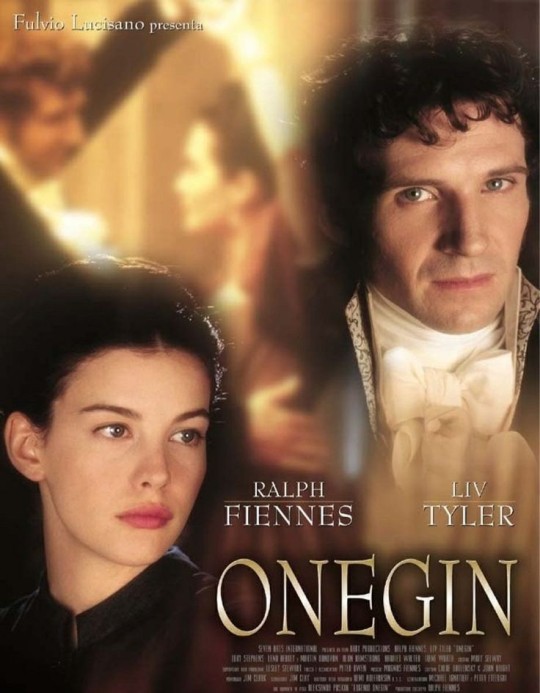

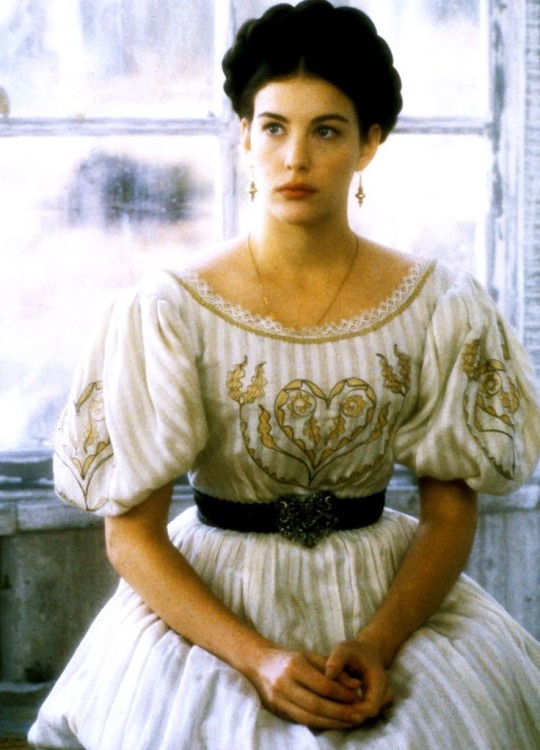
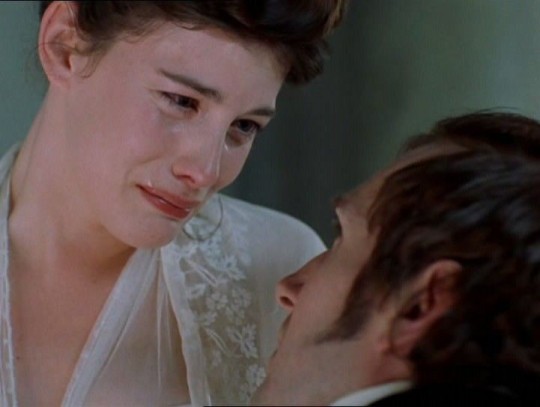
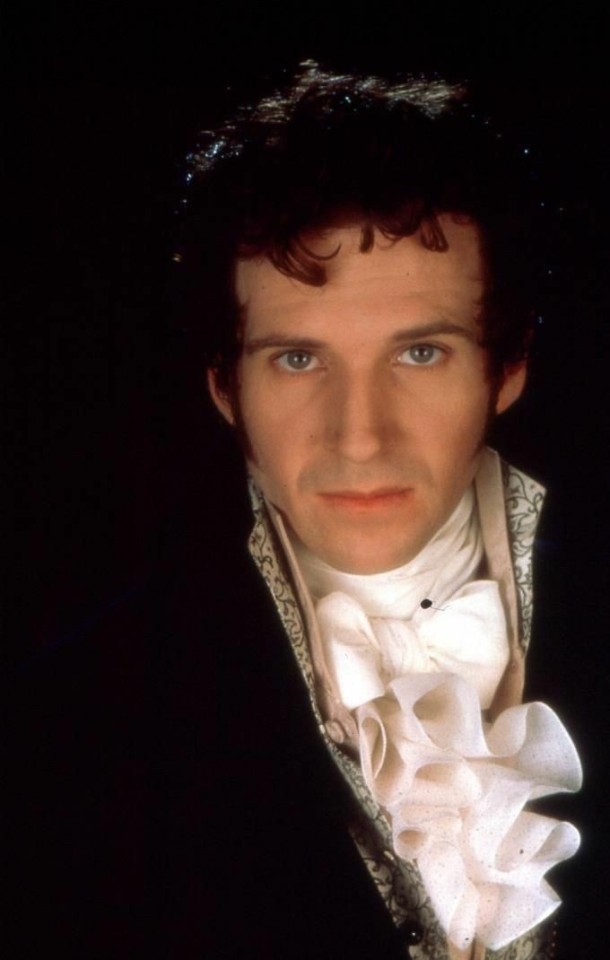
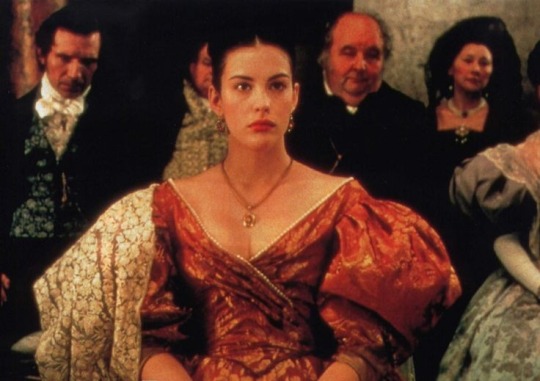
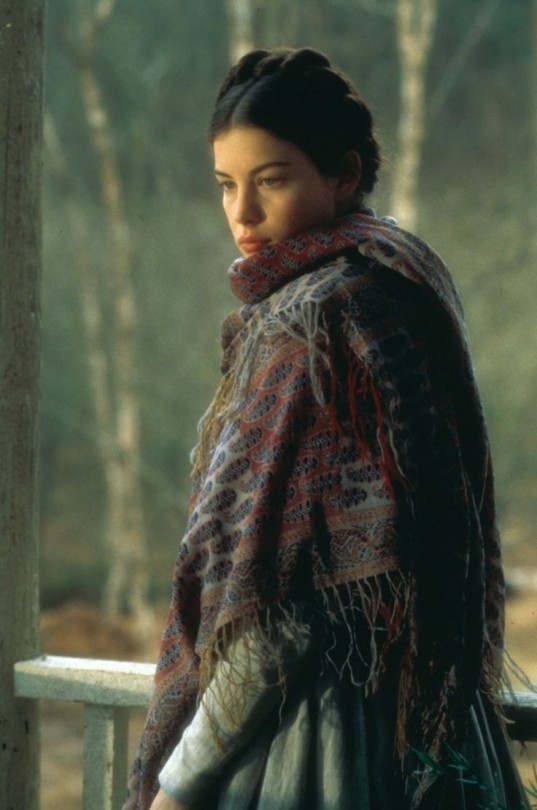
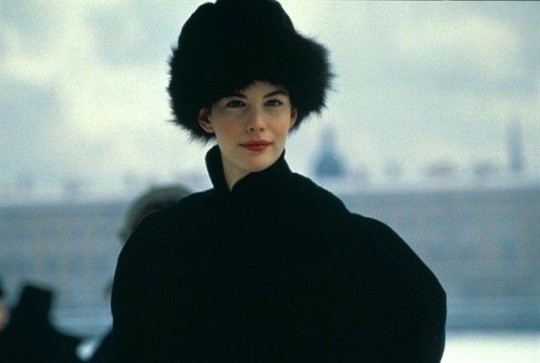
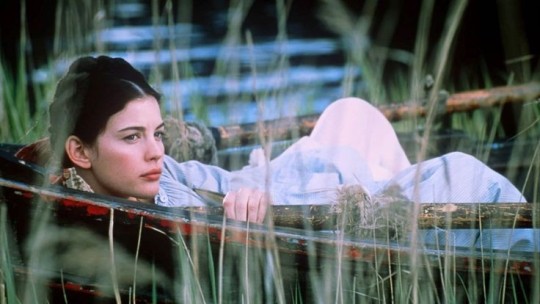

ONEGIN (1999)
dir. martha fiennes
#onegin 1999#costume drama#period drama#alexander pushkin#eugene onegin#yevgeny onegin#tatyana larina#ralph fiennes#liv tyler
27 notes
·
View notes
Text

A little lensky and onegin doodle from my sketchbook I really like 👍
#eugene onegin#vladimir lensky#yevgeny onegin#pushkin#ruslit#🧩#onegins heart shaped hair strand is my favourite detail to draw ever btw
63 notes
·
View notes
Text
...her eyes on
The east, the coming dawn of day,
The pallor of the far horizon,
Stars circling till they fade away.
The earth's dark margin softly eases,
Morning is heralded in breezes,
And daytime slowly gathers light.
Yevgeny Onegin, by Alexander Pushkin
6 notes
·
View notes
Text
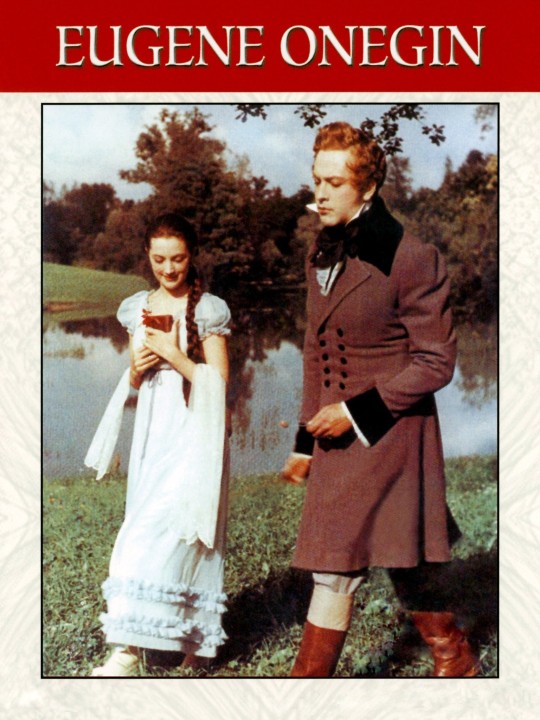
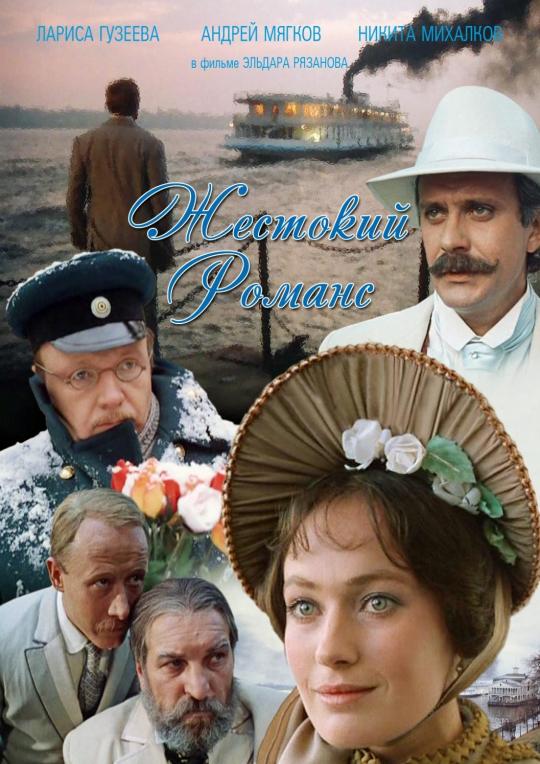
ROUND 1: GROUP C
#round 1#eugene onegin#Yevgeny Onegin#eugene onegin 1959#Yevgeny Onegin 1959#A Cruel Romance#Zhestokiy romans#russian period dramas bracket#period dramas#tumblr bracket#polls#tumblr polls#russian period dramas
2 notes
·
View notes
Text
gender is stored in the young, tragically killed poet and his dramatic reflections on life & love
#yevgeny onegin#vladimir lensky#his second act aria makes me teary every damn time#russian opera#ponderings & such
25 notes
·
View notes
Text
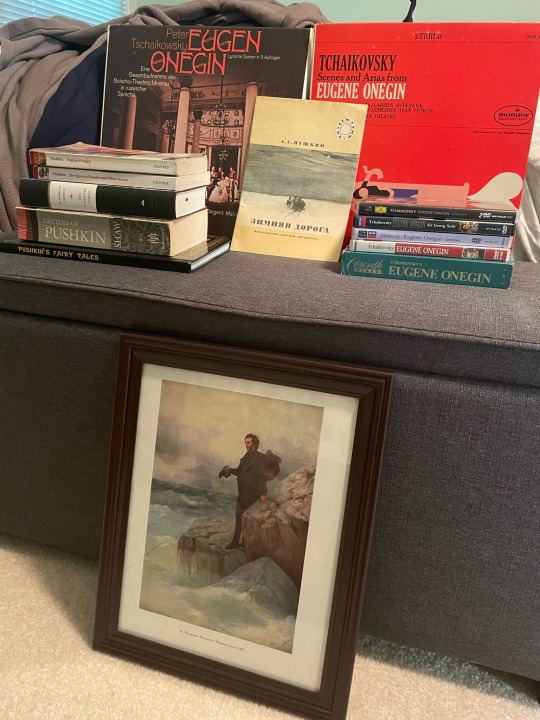
A problem, I have not.
#eugene onegin#Pushkin#alexander pushkin#russian literature#Yevgeny Onegin#romantisism#Евгений Онегин#Александр Пушкин
10 notes
·
View notes
Text
There are many Russian aristocrats who seemingly meet every aspect of themselves with repulsion and resentment, and they wish to undergo tragedy as a form of atonement. Do they only read Shakespeare.
5 notes
·
View notes
Link
Here is the full version of sketch about Eugene Onegin performed by Ze and his company.
Mind you, this sketch was released on 31th December 2018, four months before Ze was elected president of Ukraine.
Side note: Zelensky’s and Koshevoy’s names are exactly the same as Lensky’s and Onegin’s ones. ;) They were predestined to play Pushkin’s characters!
#volodymyr zelensky#Volodymyr Zelenskyy#yevhen koshovy#yevgeny koshevoy#stiepan kazanin#serhiy kazanin#eugene onegin#vladimir lensky#alexander pushkin#kvartal 95#sketch
2 notes
·
View notes
Note
Which male ballet roles do you like the most/find most interesting, and which do you like the least/find most boring?
Oooooo this is a good question and some of my answers would depend on the production based on choreography. I'm also sticking only with narrative ballets, nothing like Jewels.
Most Interesting (they're all very similar and very dramatic lol):
Yevgeny Onegin from the ballet Onegin. This role requires literally everything from a dancer from perfect acting to perfect dancing, both solo and partnering. I love the choreography, I love the music, and I love the entire ballet.
Prince Frederick from Mayerling. The amount and specific type of acting this role requires is incredible. The nuance and passion needed is so difficult because it's possible to give too much but also not enough. Not only that, but he has to stand out and keep our attention in a ballet that is entirely too long and has so much filler (like all MacMillan ballets honestly).
Ivan from Ivan the Terrible. I am OBSESSED with the entrance of Ivan and the final scene, it looks like so much fun to dance. The pure power of the role, the music, the entire ballet is awesome. If I was a dude, this would be a dream role of mine.
Least Interesting:
Jean de Brienne from Raymonda. He really has nothing to do in the ballet and the entire story could happen without him honestly. It's one of my favorite ballets, but JDB is useless lolol.
Romeo. I hate the story of Romeo and Juliet in every single medium and think everyone involved is just stupid (except Tybalt, they should have listened to Tybalt) but that's a rant for another time.
Espada from Don Quixote. I find his parts boring and useless.
15 notes
·
View notes
Text
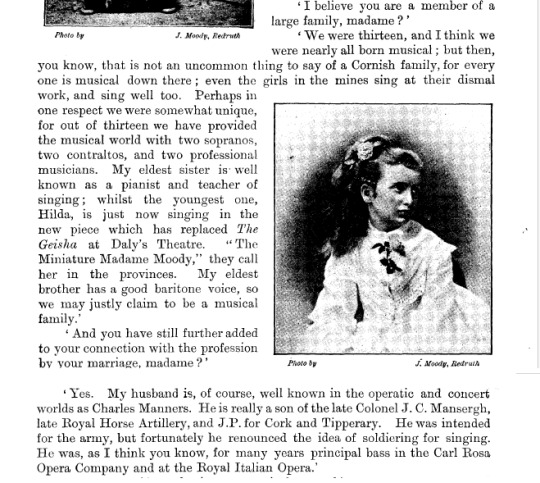
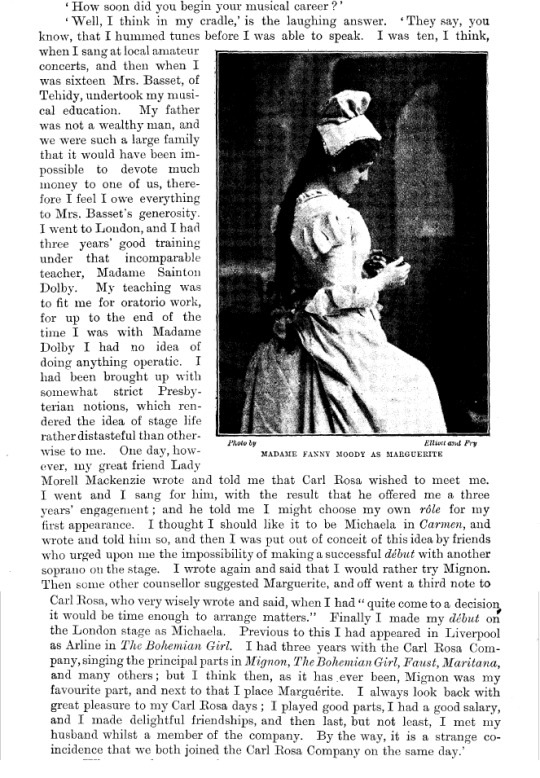

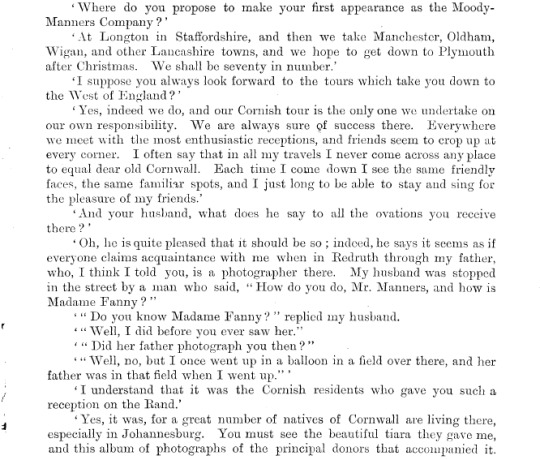
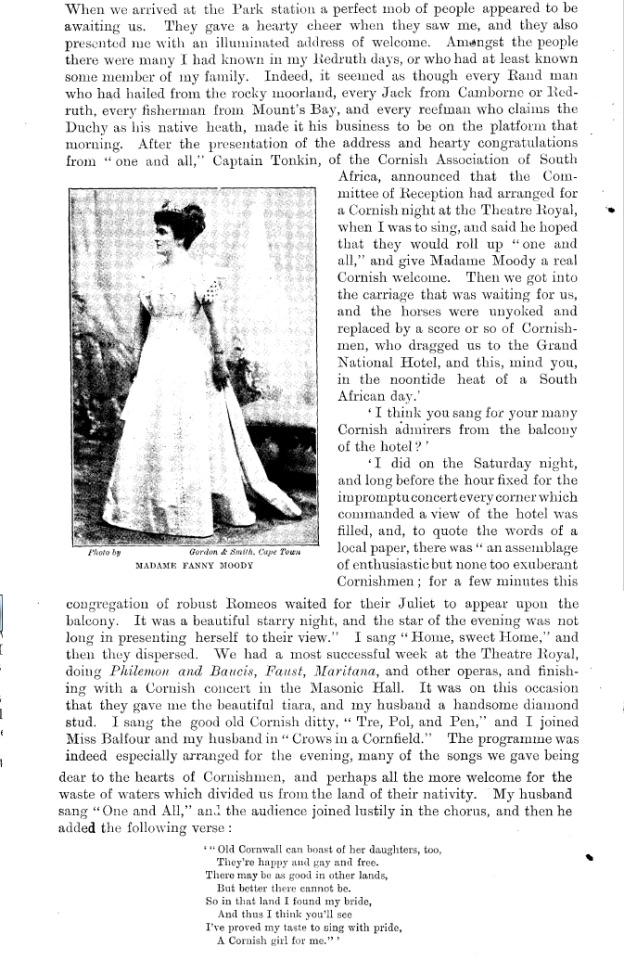
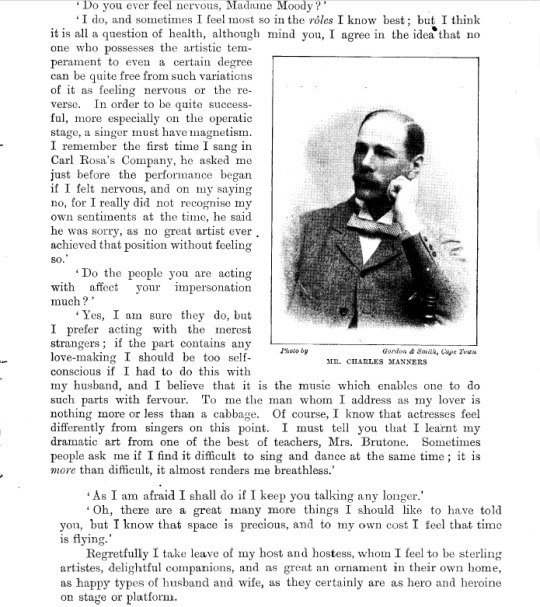
Fanny Moody – The Cornish Nightingale
Dame Fanny Moody (1864-1945) of Redruth was known as ‘The Cornish Nightingale’. Her father could, it was said, play any instrument he had ever seen. Her mother was a pianist, and their large family were exceptionally musical, in particular the daughters Fanny (Francis), Lily (1867-1950), Mabel (1874-1952) and Hilda (1876-1961). Newspaper reports show that all the sisters performed locally as young women. Fanny went on to become one of the great singing stars of her age. Hilda joined the D’Oyly Carte Opera Company in 1896, and later toured with her elder sister’s opera company. Lily, mezzo soprano, sang with J. W. Turner’s English Opera Company (1887-1902).
Fanny, allegedly seen dancing on a shop counter when young, became a pupil of Robert Heath of Redruth. Her first reported performance was in Ponsanooth on 26 March 1879 at the age of 14. Later that year Fanny’s mother died and her father was left with seven children. Nevertheless, in the winter of 1879/80, Fanny performed over a dozen concerts, mostly in Redruth, but also in Penzance and Falmouth. This intensive pattern was repeated in the next two winters, during which she built a large local following.
Her talent was recognized by Lady Mary Basset of Tehidy, who in late 1881 paid for her to train in London at the Vocal Academy of the renowned Mme. C. H. Sainton-Dolby. Fanny made her London début at the Steinway Hall, Seymour Street in June 1883. In April 1884, with other students, she gave a concert in Newcastle. All was loyally reported in Cornish newspapers.
In Newcastle she was heard by Charles Hallé, who offered her a series of return bookings. Through these she met Carl Rosa, manager of a prestigious opera company, and when asked by him to sing a ‘top C’ she gave him a ‘top D’. She made her début with the Carl Rosa Company in Liverpool on 15 January 1887, in The Bohemian Girl. Later that year Fanny’s father James died, but having seen three of his daughters on their way to operatic success. In 1889 Fanny, her fiancé, the noted bass, Charles Manners, and her sister Lily made a triumphant return to The Druid’s Hall, Redruth. The packed event was a both a celebration of Fanny’s success and of her Cornish roots.
In 1892 Charles Manners and Fanny were married. Fanny went from success to success as an operatic soprano. In 1892 she and her sister Lily sang in the first English performance of Tchaikovsky’s Yevgeny Onegin. Fanny sang many roles, including Wagner, but she was most suited to those like Cio-Cio-san, the tragic heroine of Puccini’s Madam Butterfly. Later, she and her husband formed the Moody-Manners Opera Company which operated from 1898 to 1916.
Most of Fanny’s performing life was spent touring Britain but she also travelled abroad, notably to North America and South Africa. There in 1897, after a concert, expatriot Cornish admirers followed her back to her hotel. A newspaper reported ‘There was an assemblage of enthusiastic but strangely silent and peaceful Cornishmen; this congregation of robust Romeos waited for their Juliet to appear upon the balcony…To the silent she sang Cornish songs. And as she sang, these big men of Cornwall wept.’ She was presented with a tiara with the Cornish coat of arms picked out in diamonds, which was donated for auction in the Second World War with the proceeds going to the Red Cross.
Although she travelled the world Fanny was still seen as a ‘Cornish maid’ and regularly reported in a positive, almost avuncular way by Cornish papers. Her reputation, repertoire and audience were international, but her identity was Cornish, and her success, and that of Lily and Hilda, grew from the Cornish musical environment.
Laura Alex Smith published an interview with Fanny Moody in the Cornish Magazine in 1898 which provides an insight into the singer and her world.
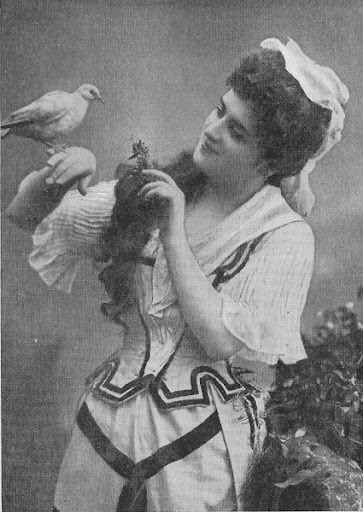
#classical music#opera#music history#bel canto#composer#classical composer#aria#classical studies#maestro#chest voice#Fanny Moody#The Cornish Nightingale#The Nightingale#Carl Rosa Opera Company#Moody-Manners Opera Company#Drury Lane#classical musician#classical musicians#classical history#opera history#historian of music#history of music#musician#musicians#diva#prima donna
4 notes
·
View notes
Text
“puşkin yaşamamış olsaydı, yevgeni onegin yine de yazılırdı” demiş osip brik. halt etmiş.
2 notes
·
View notes
Text
ma grand-mère est agée et a des problèmes de santé dont des gros problèmes cognitifs et elle a beaucoup de mal à s’exprimer
à Noël, par exemple, elle n’a presque pas parlé
aujourd’hui, mes parents m’ont emmené la voir parce que je pars demain donc je devais dire au revoir
j’étais RAVISSANTE comme je le suis toujours, avec un petit pull, mes nouvelles magnifiques bottines, et... une jupe. une jupe certes pas très longue mais bon. j’avais des collants noirs, rien de scandaleux.
nous arrivons, ma grand-mère ne dit pas un mot, je parle assez pour remplir la pièce quand tout à coup lors d’un petit blanc j’entends ma grand-mère parler......... “tu es court-vêtue”
MAMIE que j’aime ! j’avais l’impression d’avoir 18 ans de nouveau et que ma grand-mère me rappelait que je ne pouvais pas porter mes petites robes pour aller à l’Église
(et après, encore mieux, mon grand-père m’a demandé qu’elle était le prochain opéra que j’allais voir (mes grands-parents m’ont offert un abonnement) et j’ai répondu Yevgeny Onegin de Tchaïkovski, et ma grand-mère a sorti une phrase qui est apparement tirée du poème de Pouchkine <3)
18 notes
·
View notes
Text
Alexander Pushkin
'This writer's greatest achievement, apart from the literary quality of his work as a whole, in which the disciplines of classicism mesh with new freedoms released in the age of Romanticism, is nothing less than to have reformed his national language. This bold claim is no exaggeration. As he grew up, the young Pushkin was presented with at least three different linguistic forces existing as separate entities in his large country. Posh people spoke French, ignoring or despising ordinary Russian, though Pushkin heard a good deal of this tongue from the local lads and also from his dear old nanny, Arina Rodionovna. In addition, he was continually subjected in church and at school to the rich sonorities of Old Church Slavonic. By some miracle, almost without thinking about it, he created modern Russian simply by using it, choosing at will between elegant Gallicisms, vernacular Russian and his nation's equivalent of our King James Bible and Book of Common Prayer, with a sensitivity to sound, style and meaning that gives him an elevated place in the annals of linguistic reform. The newly expressive modern language was snapped up immediately by writers such as Lermontov and Gogol, and gratefully assimilated by all the (now legendary) Russian authors who followed on so soon. Every writer since Pushkin has acknowledged the latter's significant contribution to his rapidly developing culture, and they all look back with special affection to Yevgeny Onegin.'
Anthony Briggs, introduction to Yevgeny Onegin
3 notes
·
View notes
Text


ROUND 2: GROUP C
#round 2#eugene onegin 1959#eugene onegn#yevgeny onegin#Yevgeny Onegin 1959#gogol#gogol 2017#russian period dramas bracket#period dramas#tumblr bracket#polls#tumblr polls#russian period dramas
1 note
·
View note
Text
This Week’s Book is...

The Queen of Spades by Alexander Pushkin!
I loved Pushkin's more famous work, Yevgeny Onegin and I read it early this year along with some of his poetry crammed between the spring semester. We're just going to jump right into the fall tbr and start it right!
Our school is going to the Namsan Tower in Seoul on Friday, so expect some book photos and city photos soon :)
I ordered an iced latte today, but I'm still not used to the taste of coffee, I much prefer tea ahaha
Also, can we talk about how pretty this book is? So excited to read this gem!
#reading#books#icaruia reads 📖#russian literature#literary analysis#literature#aesthetic#photpgraphy#studying
5 notes
·
View notes